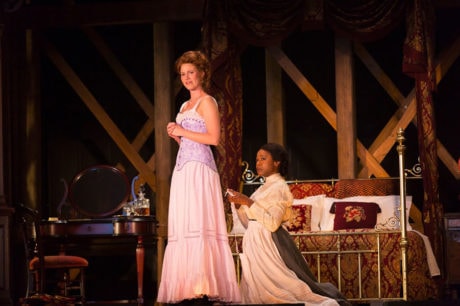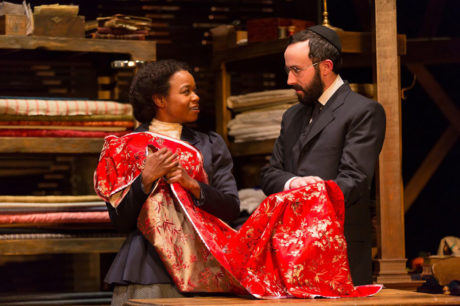It was as though God kissed my hands when I first pulled the fabric through the sewing machine and held up a finished garment.
That’s how the main character of Intimate Apparel describes her work. What might be drudgery for some is something special for Esther Mills, an African American seamstress in 1905 Manhattan. But Esther is something special too, even though the world tells her otherwise. Lynn Nottage’s play isn’t quite as strong as its central character; it doesn’t live up to all that it promises. But it’s a memorable play, filled with sharp dialogue, an intriguing historic setting, some keen insights into class and race relations, and a resilient, sympathetic heroine. And McCarter Theatre has given it a handsome, deeply involving production.

Esther has worked nonstop since the age of nine, eking out a steady living making delicate lingerie for wealthy women (and women who want to look wealthy). Now 35, she is proud of what she has accomplished on her own – as she puts it, her choice was “either learn to sew or turn back sheets for 50 cents a day” – but she feels that her best years have passed her by as she sat at her sewing machine making clothes for parties that she could never attend. Self-conscious about her looks, she thinks that no man would ever consider marrying her.
Then she draws the attention of George Armstrong, whose love letters from Panama (where he is working on the construction of the canal) fill her drab life with poetry. She receives conflicting advice on how to proceed from the women in her life. Mrs. Dickson, the proprietor of the boarding house Esther lives in, has memories of the disappointments of her own marriage and tells Esther not to set her hopes too high. Mrs. Van Buren, a wealthy white customer living on Park Avenue, fills her with encouragement and even writes letters back to George for her (since Esther can’t read or write). Also helping with the letter-writing is a different type of customer: Mayme, a free-spirited prostitute who is as experienced in the ways of the world as Esther is inexperienced.
Mayme and Mrs. Van Buren are physically constrained by the corsets Esther designs for them, which serve as a metaphor for the restrictions that early 20th Century society places on women. (Esther, Mayme and Mrs. Van Buren have three of the few positions available for women in that era. The fact that this production’s creative team is mostly populated by women serves as a rebuke to this.) Esther tests society’s limits in her relationship with Mr. Marks, a shy Jewish fabric merchant who can never be any closer to her due to his own set of constraints.
Director Jade King Carroll has crafted a lovely, graceful production that draws the viewer into Esther’s story with a minimum of fuss. Alexis Distler’s set design spreads six separate playing areas across two levels, creating an elegant look and allowing for quick scene transitions. She’s aided by Nicole Pearce’s lighting, which creates a pastoral backdrop for George’s missives from Panama, and Karin Graybash’s sound design, which uses discreet crowd noise and ragtime piano to add period flavor (Zane Mark is the Music Consultant). And Dede M. Ayite’s costumes delineate the class barriers adeptly – from Esther’s plain, functional uniform to the gorgeous lingerie she crafts for her clients.

The greatest asset of Intimate Apparel is Quincy Tyler Bernstine’s focused, transfixing turn as Esther. She may often appear glum and unsmiling, but wisdom, ambition, and seriousness of purpose shine through in her every moment of Bernstine’s performance. She receives able support from Galen Kane, whose gentle take on George enraptures the audience as much as it does Esther. (Kane uses a nicely lilting Caribbean accent in the role; Dialect Coach Thom Jones has done exemplary work here, using the characters’ accents as another method of defining class structure.)
There’s also solid work from Brenda Pressley as the jovial landlady, Jessica Frances Dukes as the earthy Mayme, and Kate MacCluggage as the not-always-proper Mrs. Van Buren. And Tasso Feldman, as the conflicted merchant, has good chemistry with Bernstine; their scenes simmer with wistful reserve.
Act One of Intimate Apparel ends on a sweet note, but in Act Two, once Esther and George are married, both the marriage and the play start to go awry. The marriage stumbles in ways so soapy and predictable that it’s almost hard to believe that both acts were written by the same playwright. It’s a disappointing turn in a play that has many moments of enchantment.
Still, Esther herself never falters. Nottage never compromises her character, and Esther’s gumption and determination carry the play through to a satisfying conclusion. While it’s not completely satisfying, Intimate Apparel is a play with a lot to say about society of a century ago and about how much – and how little – has changed. And McCarter’s exquisite production gives audiences a lot to appreciate.
Running Time: Two hours and 20 minutes, with an intermission.
Intimate Apparel plays through June 4, 2017, at the Berlind Theatre at McCarter Theatre Center – 91 University Place, in Princeton, New Jersey. For tickets, call the box office at (609) 258-2787, or purchase them online.




